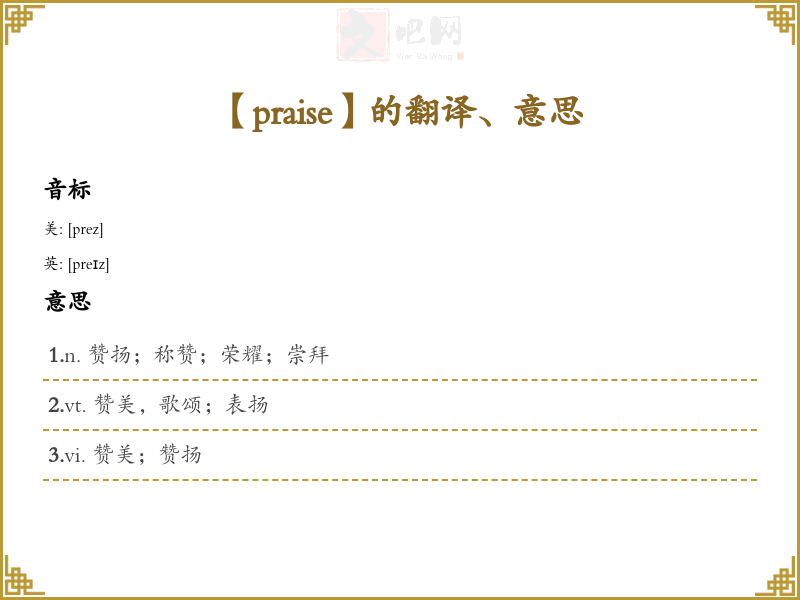【praise】的翻译、意思
时间: 2025-04-23 15:25:07
【praise】怎么读
美:[prez]
英:[preɪz]
【praise】是什么意思、字义解释
1. n. 赞扬;称赞;荣耀;崇拜
2. vt. 赞美,歌颂;表扬
3. vi. 赞美;赞扬
【praise】的详细解释
英文单词学*与分析:[praise]
1. 基本定义:
- 字面意思:Praise的字面含义是对某人或某事的积极评价或赞扬。清晰的定义为:表达对某人的成就、品质或价值的欣赏和称赞。
- 词性:Praise可以作为名词和动词使用。作为名词时,它表示赞扬或称赞;作为动词时,表示给予赞扬或称赞。
2. 词源与起源:
-
词源分析:Praise源自拉丁语“pretium”,意为“价值”,通过法语“priser”演变而来。它的构成没有特定的前缀或后缀,但可以看作与“价值”相关的表达。
-
历史背景:Praise的首次使用可以追溯到中世纪英语(约14世纪),在当时的文学和**文本中常见,用于表达对神的赞美。
-
课本:在**的英语教材中,通常在初中至高中阶段会出现,尤其是在与道德或情感相关的单元中。美国的教材中,如《Oxford English Dictionary》或《Wordly Wise》,同样会在初中及高中阶段涉及该词。
3. 使用场景:
-
正式与非正式语境:在正式语境中,例如商务会议或学术讨论中,praise用于正式的表扬,如“Her contributions were praised by the committee”(她的贡献得到了委员会的赞扬)。在非正式语境中,可以用于日常交流,如“Everyone praised his cooking skills at the party”(在聚会上,大家都称赞他的烹饪技巧)。
-
特殊场合:在法律领域中,praise可能用于法庭上的证人证言中,表示对被告或受害者的称赞。在艺术领域,艺术评论中常用praise来评价作品,例如“Her artwork received high praise from critics”(她的艺术作品得到了评论家的高度赞扬)。
4. 示例句子:
-
The teacher praised the student for his hard work.
(老师称赞学生的努力。)
出处:教育背景常见句型 -
She deserves praise for her bravery in the face of danger.
(她在危险面前的勇气值得称赞。)
出处:文学作品中常见 -
The film received widespread praise from critics.
(这部电影得到了评论家的广泛赞扬。)
出处:电影评论文章 -
Praise can motivate people to perform better.
(赞扬可以激励人们表现得更好。)
出处:心理学研究 -
He is always quick to praise others for their achievements.
(他总是迅速称赞他人的成就。)
出处:日常交流
. The charity event was praised for its success in raising funds.
(慈善活动因筹集资金的成功而受到赞扬。)
出处:新闻报道*
-
She received praise from her peers for her innovative ideas.
(她因创新的想法受到了同龄人的称赞。)
出处:工作环境 -
The author’s new book has been praised for its eloquent prose.
(作者的新书因其优美的散文受到赞扬。)
出处:文学评论 -
His leadership was praised during the annual meeting.
(他的领导在年会上得到了称赞。)
出处:商业会议 -
The community praised the volunteers for their hard work.
(社区称赞志愿者们的辛勤工作。)
出处:社区活动
5. 同义词与反义词:
-
同义词:
- commend:更正式,强调推荐或赞赏。
- applaud:通常用于公开场合,强调鼓励和庆祝。
- acclaim:指公开的称赞,通常带有热情。
-
反义词:
- criticize:表示对某人或某事的负面评价。
- blame:强调指责或归咎于某人。
- condemn:表示强烈的不赞成或谴责。
. 学方法:
- 谐音联想记忆:将“praise”与“prize”联系在一起,想象获得奖品(prize)是因为受到了称赞(praise)。这种关联可以帮助记忆。
7. 关联词汇:
- admiration(钦佩)
- compliment(赞美)
- applause(掌声)
- recognition(认可)
- laudation(赞美)
通过以上分析,希望能帮助你更好地理解和使用“praise”这个词!
【praise】例句
1、[V-T] If you praise someone or something, you express approval for their achievements or qualities. 称赞
-
例:The American president praised Turkey for its courage.美国总统称赞了土耳其的勇气。
-
例:Many others praised Sanford for taking a strong stand.还有许多人称赞桑福德立场坚定。
2、[N-UNCOUNT] Praise is what you say or write about someone when you are praising them. 赞美
-
例:All the ladies are full of praise for the staff and service they received.所有女士对工作人员和她们得到的服务赞不绝口。
-
例:I have nothing but praise for the police.我对警察只有赞扬。
